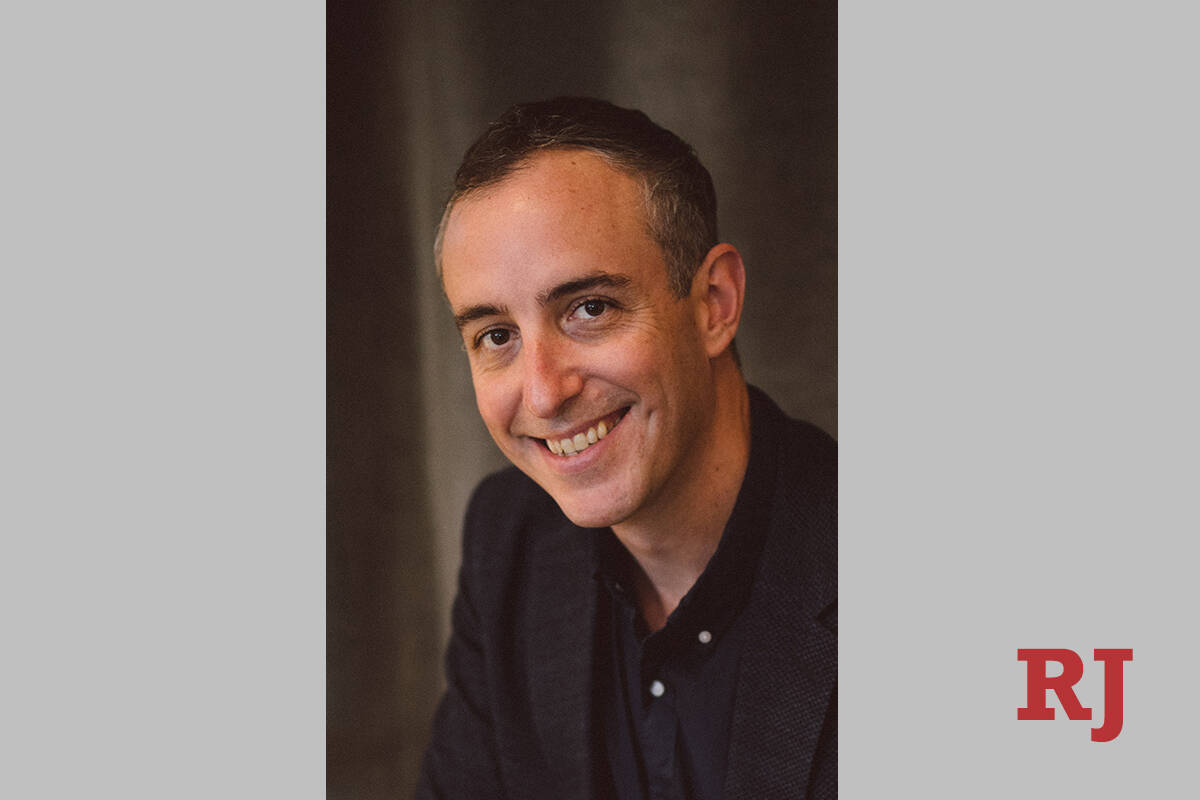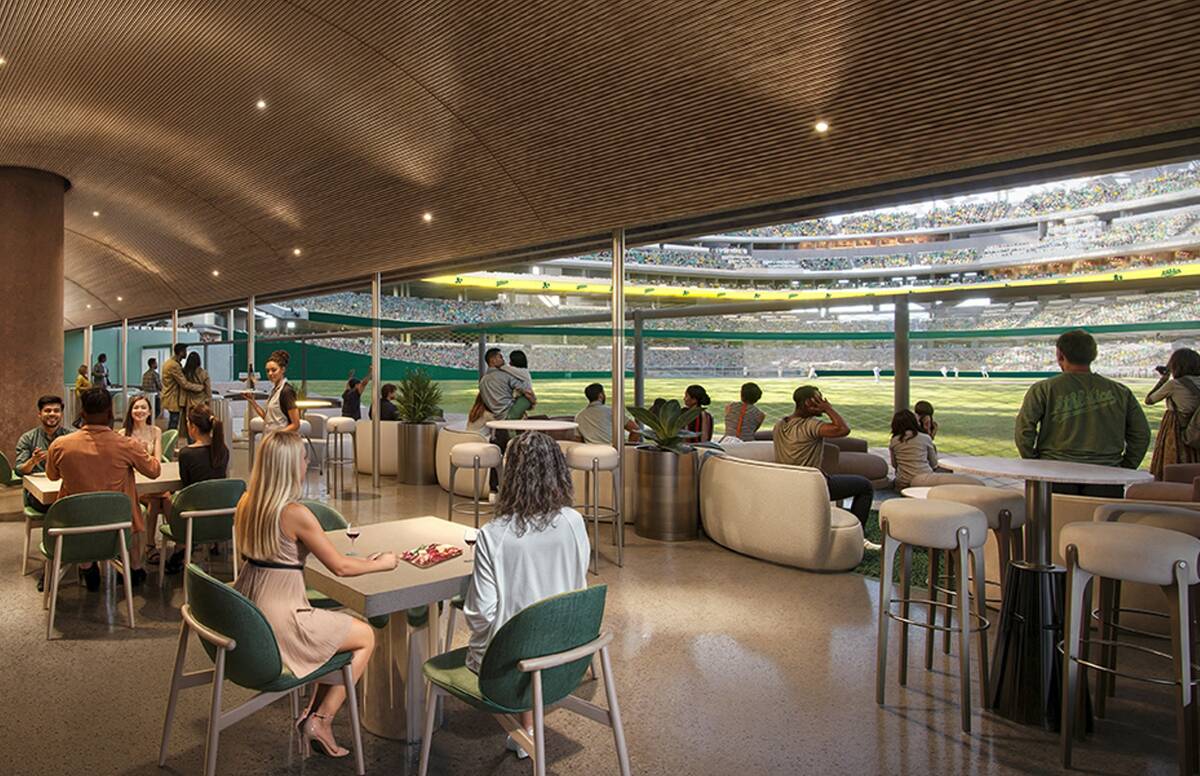A’s Las Vegas ballpark experience to be shaped by famed restaurateur
The Athletics will lean on hospitality to create a unique, Las Vegas-quality game day experience at their Las Vegas ballpark when it opens in 2028.
To ensure they can meet and even exceed high hospitality expectations that come with being located in Las Vegas, the A’s brought in famed restaurateur and New York Times best-selling author Will Guidara to assist the MLB team in creating its stadium fan experience.
Guidara talked exclusively with the Las Vegas Review-Journal about his plans to bring hospitality to the forefront of the A’s stadium experience on the Strip.
Hospitality is especially big here in Las Vegas, and you’ve seen some of these elements get infused into new stadiums. First off, what’s your vision coming into this project as far as putting your hospitality touches on it and looking to make a product that might be different from those in Major League Baseball and other sports as well?
I think about, write about and talk about hospitality all the time. I like to define the word and redefine it, because I think just the better you are at articulating something, the better you become at bringing it to life. And one of my favorite definitions is that hospitality is being creative and intentional in pursuit of people. And that, albeit a philosophical articulation, is truly the approach that we’re trying to take to this project.
Which is to say that so many of these new stadiums and even the way they’re brought to life, they’re done with this relentlessness around the product. Whether it’s the design of the stadium, the materials with which it’s built, the design of the spaces and the suites and the caliber of the food and all that. And we’re just looking to bring that same sensibility to how we engage with people, how we make them feel, how we enliven the space and how we make going to see a game as fun as humanly possible, as engaging as humanly possible and in a way that makes every single person that walks into that stadium feel a sense of belonging and leave hopefully with a story to share.
So you’ve done this before at restaurants, with a few hundred people. How do you think it’s going to be translating to a ballpark with 30,000-plus people?
Well, I think that you can look at it at 30,000 people or you can just look at it as lots of different little zones and little spaces that serve a lot fewer than that. And I think if you bring the same amount of care and precision and discipline to each one of the spaces, you can do pretty extraordinary things. And each one of them where we’re looking to not create one experience, but a ton of smaller experiences, each one that has its own identity. Each one that is created through a unique vision. Obviously, they all need to be part of the same conversation, but in breaking it down into all its individual parts, I think we’re going to be able to do some really interesting stuff.
In this modern era of stadiums, you’re seeing them shrink a little bit because people have their crystal-clear TVs, they have all their refreshments and all the comforts of home. What is the importance of already focusing on hospitality ahead of time? They broke ground on this stadium about a month ago, and you’re already getting in on the ground floor and being able to plan that out before the stadium even opens.
Yeah, that’s why this is so exciting for me getting to be involved with this as early as we got into the project is that we can really craft the experience and build the space from the very beginning of it. Listen, this is I think we’re in a time where there’s fewer and fewer in-person moments in our lives, and that means that the human moments need to be as human as humanly possible, right?
Yeah, lot of people on big TV, they can do whatever they want and they can watch these games. So our opportunity, actually, I’m gonna go so far as to say our responsibility, is to make the experience of actually going in person something that is unforgettable. My favorite quote about hospitality comes from Maya Angelou, she said “People will forget what you say, they’ll forget what you do, but they’ll never forget how you made them feel.” And that’s what we’re focusing on.
It’s doing little things and big things, creating nuanced experiences that make people feel something that give them a reason to actually leave their home, get together with the people they want to feel a connection to and get back out into the world. And if we can give them something to write home about then I think we’ve done something pretty awesome.
The goal is always to meet people’s expectations; but if you can exceed those that is going to help you know did bring your vision to life. How can you do that especially in a city like Vegas where there’s so much hospitality and people are kind of doing this on a daily and nightly basis?
Yeah, I think the whole idea is to rewrite some of the rules and in doing so, definitely exceed their expectations. To walk into a beautiful stadium and to eat good food and to watch a great game and all of that. What we’re trying to do is come up with thoughtful and creative ways to just give them little moments that they haven’t experienced before. And yeah, Vegas is filled with unbelievable hospitality, I think Vegas is one of the greatest hospitality cities in the world, and yet I still think there’s a lot of original ideas that we can bring to the table.
In some of the talks you’ve done and written in your book that adding even the smallest gesture can go a long way with a customer. Talk about that and how that you can add that to the stadium experience from everywhere from the general admission seats all the way up to the suites.
Now one of the ways that I think about hospitality is if you’re thoughtful and do some simple pattern recognition, look at the things that happen over and over again. Then back up and just think about what is the coolest, most fun, most gracious way to respond when those things happen. You then can really start delivering creative hospitality at scale.
We’re not ready to share any of the specific things that we’re planning to do, but we’ve identified some of these moments. We are so excited about some of the ideas that we’ve come up with little things that, well, if they ever happened to me at a game, I would walk away and talk about them. I can’t wait to be in that stadium after opening and look at people when these things are happening for them.
There will be more than just baseball games happening at the stadium with everything from special events to community events. How different do you approach those events compared to a game? Or would it kind of be one and the same and just kind of adjusting to the atmosphere?
Well, for sure there’s certain things that will be consistent regardless of the type of event that. I talked about looking at an experience and the thing that happened over and over again, those things change right between a concert, or a game, or a community event. We do experience design specific to each use case in an effort to figure out how to elevate every single one of them.
Then just as far as yourself, how hands on, have you been and how hands on will you be, you know, leading up to the building of the stadium and then once it opens and people are inside and you all are bringing to life what you all have been planning for what will be years when the ballpark opens in 2028?
I don’t know if this is its strength or a weakness, but I have an inability to not care once I decide to get involved with something and when I start caring, I care a lot. I’m gonna be very hands on. I’m literally I was almost late to this (interview) because I was with my team and deep in the weeds on one of the spaces and literally talking about how things should be framed on a wall, I care about details. When we get involved with something, we go all in.
There aren’t many times in life where you get to put your fingerprints on something as extraordinary as what I believe this has the capacity to be. And I don’t take that for granted and we don’t intend to squander this opportunity.
Contact Mick Akers at makers@reviewjournal.com or 702-387-2920. Follow @mickakers on X.





















